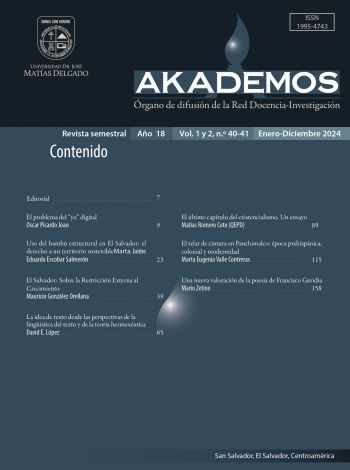The idea of text from the perspectives of text linguistics and hermeneutic theory
DOI:
https://doi.org/10.5377/akademos.v1i40-41.19670Keywords:
Exegesis, Hermeneutics, Intentio auctoris, Intentio textūs, Mens auctoris, Interpretation, Understanding, Text, Semantics, Coherence, Cohesion, Orality, Speech, WritingAbstract
This paper explores the idea or notion of text —what is a text?— from two perspectives: that of text linguistics and that of hermeneutic theory, emphasizing the particularities of each of them, but guided by the theory of text developed by hermeneutics, which conceives it in an open manner and as a bearer of semantic autonomy in relation to its author, its first readers and its original context. From this approach, the paper raises questions that all scholars of literary, philosophical, historical and theological texts should answer: is it possible to maintain that the meanings of a text are infinite, in accordance with who reads them and their context? Are the meanings of a text unlimited? Are the meanings of a text limited? Can we speak of one true meaning or are they all equally valid? In other words, can we consider the idea of a predominant meaning within the multiplicity and plurality of meanings? All this raises but does not solve an old problem of the old hermeneutics, and which continues to manifest itself in the new: the problem of intentio auctoris, sensus auctoris or mens auctoris or, in other words, the problem of whether there is something that we can call the original meaning that the author has given to his writing and, if there is, whether this can be determined with precision. However, the study also proposes the problem of the validity of the reader's interpretive constructions.
Downloads
359

